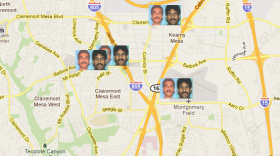The decision to send hijackers Khalid Al-Mihdhar and Nawaf Al-Hazmi to San Diego was supposedly made in Karachi, Pakistan. That’s where one of the 9/11 architects, Khalid Sheikh Mohammed, said he found a San Diego phone book at a local flea market. After thumbing through it, he claimed he sent the two 20-something men to the city.
Al-Hazmi and Al-Mihdhar arrived here in February of 2000.
“The hijackers lived very openly here in San Diego," San Diego County Sheriff Bill Gore said.
Gore was the FBI special agent in charge of the local bureau when the attacks occurred.
“They were not hiding," he said. "They were going to school. They were listed in the phone book. They had insurance for their car. They had drivers’ licenses.”
Al-Mihdhar and Al-Hazmi flew the American Airlines jet into the Pentagon on Sept. 11, 2001. Investigators say as preparation, the men took lessons at Sorbi’s Flying Club in San Diego.
Retired professor Abdusattar Shaikh unwittingly rented rooms in his Lemon Grove home to the two hijackers. He described them 10 years ago as simple desert men or Bedouins. They ate and slept on the floor. They prayed regularly at the Islamic Center of San Diego and at a mosque in La Mesa.
“They were home most of the time, reading the Koran listening to the Arabic cassettes," Shaikh said back then.
But former Sen. Graham, who co-chaired the Congressional Inquiry into 9/11, said the hijackers led a less than pious lifestyle outside the mosque and home.
“Well, they drank," the Florida Democrat said. "They went to nightclubs, strip clubs and at one point, Al-Hazmi wanted to marry one of the strippers but that was finally quashed.”
What we don’t yet know about the hijackers, according to Graham, is who financed their mission.
Graham said a Saudi man named Omar Al Bayoumi helped the two hijackers find apartments in San Diego and introduced them to other Muslims in the area. Graham said before Al Bayoumi helped the men, he received $465 per month from a Saudi government contractor. Afterward, his monthly allowance jumped to $3,700.
Graham believed the funding source was Saudi government officials. He says his staff tried to interview Shaikh, who had rented rooms to Al-Hazmi and Al-Mihdhar.
“He was an informant for the FBI, as a paid asset," Graham said. "His principle responsibility was monitoring Saudi youth living in the San Diego community as to whether they were contemplating any actions that would be detrimental to the United States."
The former senator said his staffers were never able to to interview him.
“He was taken into protective custody immediately after 9/11 and held for the better part of four years, at the end of which he was given a $100,000 payment and discharged of his responsibilities," Graham said. "He was withheld from us and in my own opinion, it was purposeful so that we would not get access to whatever information he had.”
That information might link the Saudi government to the hijackers, according to Graham.
Sheriff Gore, the FBI's lead agent here at the time, said he was not in a position to know if attempts to interview Shaikh were blocked by senior officials at the FBI or in the Bush administration. But he added it’s not as if Shaikh was never scrutinized.
“We thoroughly investigated, interviewed Dr. Shaikh on multiple occasions," Gore said. "And there was not one piece of information. The evidence wasn’t there. The decision of whether or not to talk to Sen. Graham was Dr. Shaikh’s decision and he had a lawyer and chose not to talk to them.”
The local FBI, under Gore, was scrutinized as well in the 9/11 investigations. The Justice Department’s Inspector General said in 2005 that “the time that Al-Hazmi and Al-Mihdhar spent in San Diego (in the months before 9/11) was an opportunity during which the FBI could have obtained information about them but did not.”
The Inspector General cited the hijackers' ties to two people known to the FBI -- Al-Bayoumi and former FBI informant Shaikh.
“I don’t know why the hijackers would have drawn any scrutiny when they weren’t wanted for anything they were in the country legally at the time," Gore responded. "I don’t know why they would have drawn scrutiny except they were Muslims."
Gore said the CIA knew at least three months before the attacks that Al-Mihdhar and Al-Hazmi had connections to Al Qaeda and were in the U.S. It the spy agency had informed the FBI about the two men, local agents could have helped find them, Gore said.
”Had we gotten that in a timely fashion in late 2001, they were long gone from San Diego but we could have maybe traced back where they came from," Gore said. "That’s all pretty clear with 2020 hindsight.”








